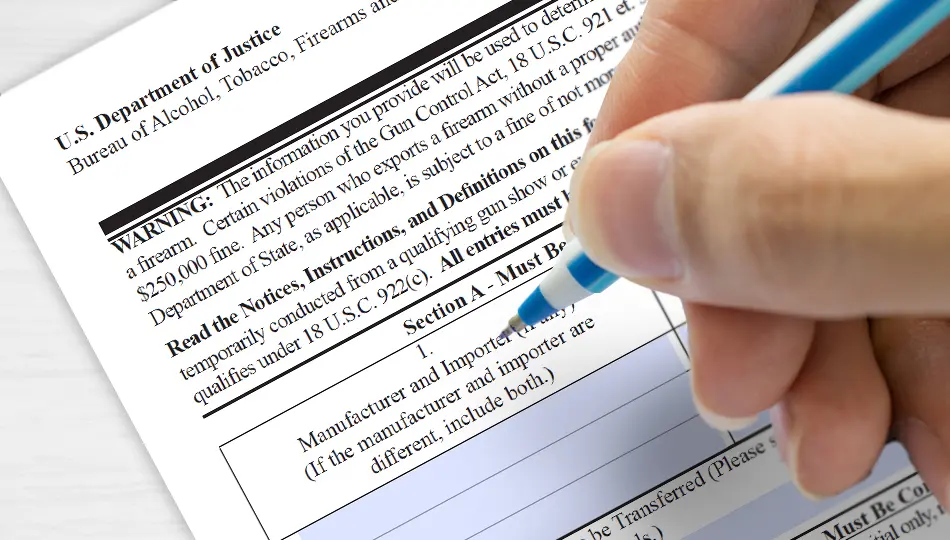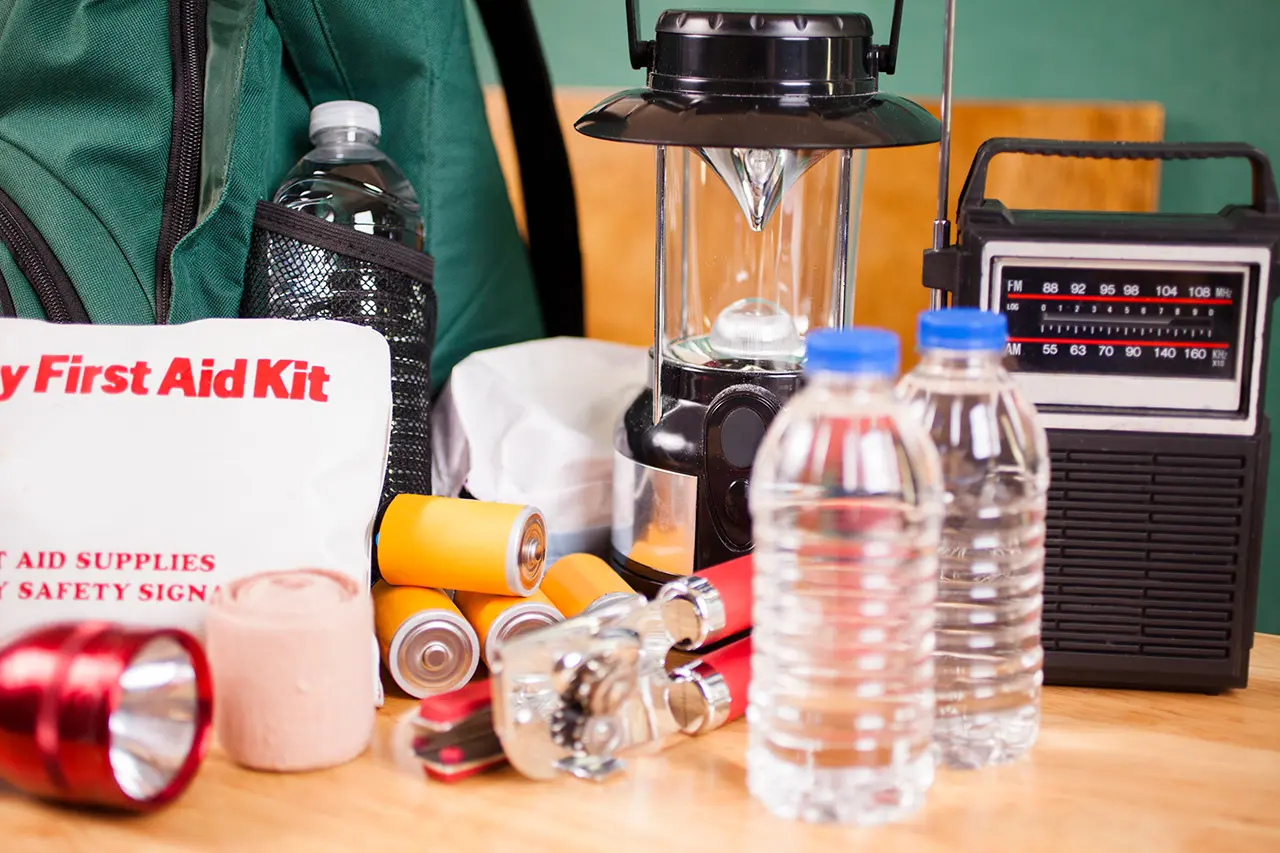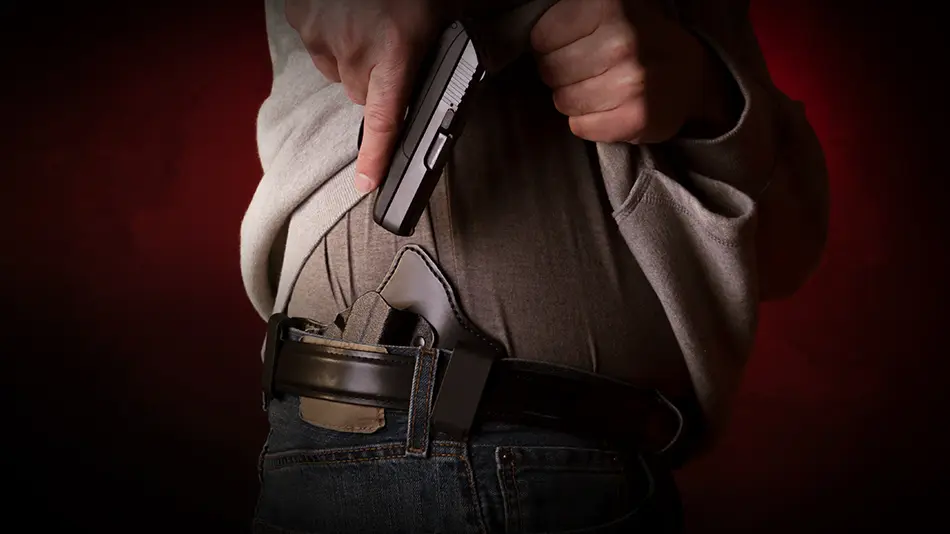
Looking to purchase a firearm from a licensed dealer? In every state across the U.S. today, part of that process involves a firearm background check, the primary component of which is a Firearms Transaction Record, also known as the Federal Bureau of Alcohol, Tobacco, Firearms and Explosives (“ATF”) Form 4473. Completing this form involves divulging personal information, requiring you to trust a retailer, who may be a prime target for thieves.
The stated purpose of forcing people to undergo background checks prior to purchasing a firearm is to ensure that prohibited persons don’t purchase firearms. However, during surges in firearm sales, gaps may appear in the FBI’s processing of background checks, and incomplete reporting from some agencies, mean that it’s a crapshoot as to whether a felon, illegal immigrant, or drug dealer will be denied. Increasingly, there are calls for background checks under the current system to be applied more broadly, which some states have implemented or are attempting to implement.
Let’s break down what happens, and why, in the current firearm background check scheme. Then, you can decide for yourself whether this system deserves to be expanded, fixed, or tossed aside altogether.
When Did Firearm Background Checks Begin?
Given how much the anti-gun Brady Campaign to Prevent Gun Violence (currently called Brady: United Against Gun Violence), complains about inefficiency and the speed with which the National Instant Criminal Background Check System (“NICS”) does its job, it may surprise you to learn that it’s one of the reasons NICS exists.
In 1993, the Brady Handgun Violence Prevention Act (“Brady Act”) amended the Gun Control Act (“GCA”) of 1968 to both expand the list of persons prohibited from purchasing or owning firearms and lay the groundwork to establish the NICS to help enforce that prohibition. The ATF Form 4473 is the aspect of this law that we as gun owners most commonly encounter.
Who’s a Prohibited Person?
Per the GCA, the list of people who are prohibited from the purchase or ownership of firearms or ammunition is a long one. There are obvious categories, including felons, fugitives from justice, illegal aliens, and anyone who’s been adjudicated as a mental defective. The list also highlights people under restraining orders for stalking or harassment, people with domestic violence convictions, and anyone who’s been involuntarily committed to a mental institution. Some are less intuitive, such as unlawful users or addicts of controlled substances, anyone dishonorably discharged from the U.S. Armed Forces, or those who’ve renounced their United States citizenship.
What’s Involved in a Background Check for Firearms?
When prompted by a Federal Firearms License holder (“FFL”), a licensed firearm dealer, who’s selling you a gun or initiating the firearm background check for a private party or gun show transfer depending on your state and local laws, you must present valid identification according to the laws in your state and fill out ATF Form 4473.
From there, the information you provided is relayed to the National Crime Information Center (“NCIC”) system, either by phone or the internet. NICS then compares your data against three databases: the NICS Indices, the Interstate Identification Index (“III”), and the NCIC databases. Ideally, with a low number of applicants, this process will only take minutes; but the reality is it can take days.
Assuming nothing comes up indicating the purchaser is a prohibited person, the transfer is approved, and payment can then take place. Once payment has taken place, the purchaser can take their purchase home.
If there’s a problem, the FBI has three business days in which to investigate and make a determination regarding the validity of the information indicating that the purchaser may be a prohibited person. In the vast majority of cases, it’s simply mistaken identity, and the confusion is either cleared up, or the three business days expire, the transaction may proceed by default. Some—but not all—states have their own NICS team that assists the FBI in this process.
What States Don’t Require Background Checks for Firearms?
Federal law requires background checks for firearm purchases from FFLs in all states. If you’re buying a new or used gun from a retail gun store, you’ll fill out an ATF Form 4473.
What’s not uniform across the country are the laws regarding firearm sales between private parties. Be it at a gun show, or elsewhere, most states don’t require a NICS check for sales between private citizens who aren’t federally licensed firearm dealers.
The that currently do, have passed so-called “universal background check laws,” and include: California, Colorado, Connecticut, Delaware, Maryland, Nevada, New Jersey, New Mexico, New York, Oregon, Rhode Island, Vermont, Virginia, and Washington, as well as the District of Colombia.
There are a handful of states that have differing laws on how and when a background check is required, so it’s important to check your state and local laws before attempting to purchase a gun.
What Happens if You Fail a Firearm Background Check?
Most commonly, if a NICS check doesn’t go through, a “Delayed” response is returned. This means the NICS staff needs more time to research.
Often, if you have a very common name or are unlucky enough to have identifiers or an address similar to a prohibited person, this may result in a delay, and NICS will have three business days to make a determination. If a determination hasn’t been made after three business days, the FFL may transfer the firearm unless otherwise prohibited by state or federal law. However, if a firearm background check results in a “Denied” response, this means one of two things: You’re a prohibited person, for one of the aforementioned reasons; or you’ve been falsely identified as one.
If you’re not a prohibited person, and your ATF Form 4473 has been denied, you have an option available. You can file an appeal called a “firearm-related challenge” through the FBI. This process will provide you with both the reason you were denied and give you an opportunity to challenge the validity of that denial. The challenge process doesn’t clear your background check permanently for future purchases, which means you may run into the same issue again. There are more comprehensive appeal processes that may help with this issue, so it’s recommended you contact an attorney before taking these steps.
Frequently Asked Questions About Firearm Background Checks
The information provided in this publication is intended to provide general information to individuals and is not legal advice. The information included in this publication may not be quoted or referred to in any other publication without the prior written consent of U.S. LawShield, to be given or withheld at our discretion. The information is not a substitute for, and does not replace the advice or representation of a licensed attorney. We strive to ensure the information included in this publication is accurate and current, however, no claim is made to the accuracy of the information and we are not responsible for any consequences that may result from the use of information in this publication. The use of this publication does not create an attorney-client relationship between U.S. LawShield, any independent program attorney, and any individual.





I am sure I have my identity stolen from a gun shop 7 years ago. The information on this form give a theft all the information they need. Who is checking the FFL dealers? More importantly who in that shop has the information that the form gives? I advised the police that I had purchased a weapon and where at the time (in November- December 24th someone had used my info in another state, $4500.00). I went back in Feb. of the the next year to notice that some of the younger people that were in the shop were gone. I know the form is needed to purchase a weapon but where does that form go from there? For all I know it went home for future use. It should be destroyed and a separate record kept to show that the proper authorization was received with less information.
i live in ohio and have a CHL if i get another hand gun can i skip the back ground check with just my ohio CHL
I once tried to have a background check ran without trying to purchase a gun. My thinking was if there was an issue, say I was a victim of Identity theft, I wouldn’t end up being arrested for illegally trying to purchase a gun. They wouldn’t allow me to and required a serial number off of a gun in order to run the request.
You can do this, but not at a gun store. It is done through the FBI website and you have a right to see your criminal history and check it for errors.
Good information; every gun owner should know this and be aware of every state that accepts their gun permit. Thank you.
Thanks for reading!
To tell the truth, it is so cool that you enlightened this topic regarding Firearm Background Checks and significant nuances connected with it because really often people can be seriously misguided. I would like to highlight that it is really important to have a strict prohibition on firearm sales to persons who pose the threat to the civilian pollination and I’m so glad that per the GCA, the list of people who are prohibited from the purchase or ownership of firearms or ammunition is a long one. I think that it is crucial to approach this prohibition in a responsible way in order to avoid serious violations and fatal consequences. I can say that this list is quite justified and fair because all people, who make the list, deserve to be there equally. It is really wonderful that people with domestic violence convictions can’t purchase or ownership firearms or ammunition because they are no less dangerous than murderers and I think that such prohibition needs to be unchanged.
I have a concern about the E4473 that the website of the same name uses. Is this becoming a requirement or is this a tool for lazy gun shops? It’s a third party that takes all the info from a 4473 that then stores it and all your purchases on their servers. I just want to know if others have any experience with this as my LGS started using them exclusively and it has really put me off from buying from them anymore. It’s a shame because I’ve been dealing with them for over 15 years and this just seems wrong, one of those trust your gut choices to stop doing business with them over it. If it’s the new requirement then I guess I’m stuck in any event. I just wanted others thoughts on this E4473 website.
This is such an important and well-explained guide! The ATF Form 4473 is a critical part of the firearm purchasing process, and your post does a great job of breaking down what it means for buyers. I especially appreciated the emphasis on understanding the questions and how they relate to background checks. Do you think there’s enough awareness about the importance of answering these questions honestly and accurately? Thanks for sharing this valuable resource—it’s a must-read for anyone considering purchasing a firearm!
Firearm background checks, required for purchases from licensed dealers, involve filling out ATF Form 4473 and a NICS check to ensure the buyer isn’t a prohibited person. While delays or denials can occur, most issues are resolved within three business days.
Firearm background checks, like ATF Form 4473, are a critical part of ensuring safety and compliance with federal laws.